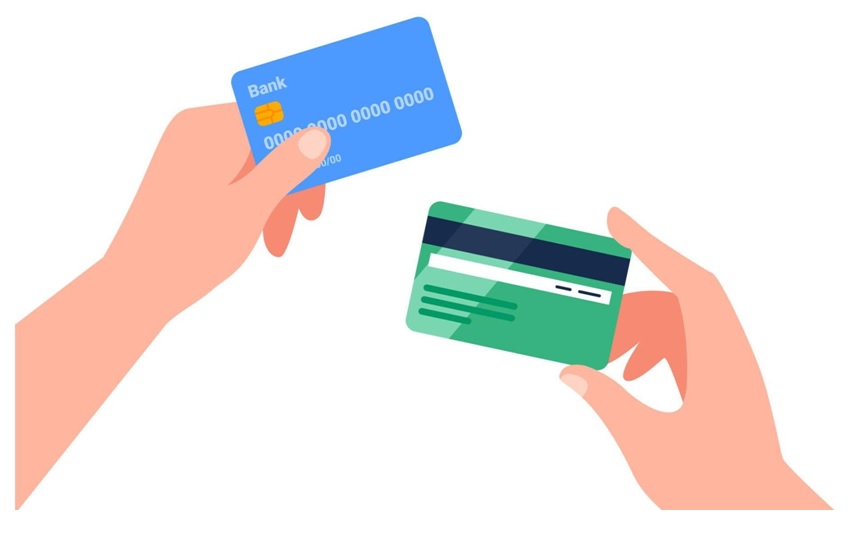Debit Card Vs Credit Card: What’s the Difference?
When it comes to making payments, there are two popular options to choose from: Debit cards and Credit cards. Both serve the same purpose of making transactions, but the way they do it is very different. So, what’s the real difference between these two types of payment options, and which one is better for you?
Let us first understand what is a debit card and what is a credit card.
Debit Card
A Debit card is a plastic card that looks similar to a credit card, but it works differently. Debit cards are linked to your bank account, and the money is directly debited from your account when you make a transaction.
In short, you can only spend the money that you have in your bank account. If you don’t have enough money in your account, then the transaction will be declined. With a debit card, you only spend what you have, and you cannot borrow money from the bank.
Credit Card
A Credit Card is also a plastic card that allows you to make purchases, but the money is not deducted immediately from your account. Instead, you can borrow funds from the bank and repay it later with interest.
Credit cards have a credit limit, which is the maximum amount you can borrow. You can use the credit card to make transactions up to the credit limit, and the bank will send you a bill at the end of the month. You can then pay the bill in full or in part, and the bank charges interest on the outstanding amount.
Now that we have understood what a debit and credit card are let us look at the differences between them.
1. Spending limit and borrowing capacity:
The major difference between a debit card and a credit card is the spending limit and borrowing capacity. With a debit card, you can only spend the money that is in your bank account.
On the other hand, with a credit card, you can borrow funds from the bank up to a certain limit. This means that if you have a large purchase to make, such as a new car, then a credit card may be more suitable than a debit card, as you can use your borrowing capacity to finance the expense.
2. Credit Score:
Another important difference between a debit card and a credit card is the impact they have on your credit score. When you use a debit card, the bank doesn’t report your transactions to credit bureaus, and therefore, it doesn’t affect your credit score.
However, a credit card can affect your credit score as your payment history, credit utilization, and length of credit history are factors that contribute to your credit score.
If you make your payments on time and keep your credit utilization low, then your credit score will improve, and if you miss payments or use a large percentage of your credit limit, then your credit score may decline.
3. Interest rate and fees:
Credit cards charge interest on the outstanding balance, and the interest rates are usually higher than the ones charged on personal loans. The interest rate on a personal loan is fixed, whereas the interest rates on credit cards are variable and can change at any time.
On the other hand, debit cards don’t charge interest, but they may charge fees for certain transactions, such as ATM withdrawals, foreign currency withdrawals, and balance inquiries.
These fees can add up, and it is important to check with your bank regarding the fee structure before opening an account.
4. Fraud protection:
When it comes to fraud protection, both debit and credit cards offer different types of protection. Debit cards come with zero liability protection, which means that if you report the card lost or stolen within a certain time frame, your liability is limited, and the bank will reimburse you for unauthorized transactions.
Credit card companies also offer fraud protection, and in some cases, you may have a $0 liability policy. But, the process of getting the money back may take longer as the bank investigates the fraud. So, while both offer protection, the process of reclaiming money may differ.
Credit Cards in India:
Credit Card in India are a popular payment option and are widely accepted at various merchants. With the growth in digital payments, more and more people are opting for credit cards as they offer convenience, rewards, and discounts. Credit cards in India come in various types like travel, fuel, lifestyle, and co-branded cards.
Travel credit cards offer rewards for travel-related expenses like flight bookings, hotel bookings, and car rentals. These cards usually come with additional benefits like free lounge access, travel insurance, and theft protection.
Fuel credit cards offer rewards and discounts on fuel purchases, and some also offer cashback and rewards on other types of spending.
Lifestyle cards offer benefits like movie ticket discounts, shopping discounts, and restaurant discounts, while Co-branded credit cards are issued by banks in partnership with retail or travel companies, and offer rewards and discounts with that particular company.
Conclusion:
In conclusion, the choice between a debit card and a credit card depends on your financial situation, needs, and goals.
If you have money saved up, then a debit card may be a better option as you can avoid paying interest and fees. But, if you need to borrow money, then a credit card may be a suitable option as you can make payments over time with interest.
However, it is essential to use credit cards responsibly and avoid overspending, as it can lead to debt and financial trouble. Ultimately, the key to finding the right payment option is to do your research, review your financial goals, and choose what works best for your situation.




